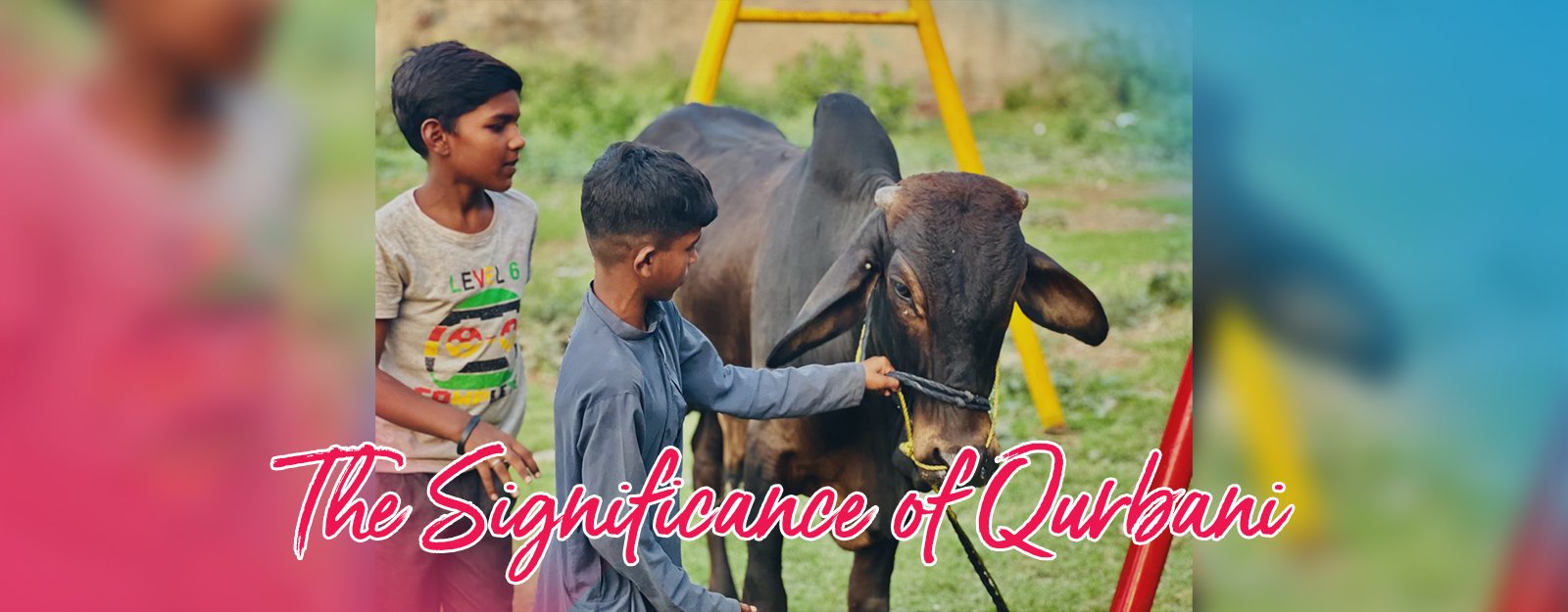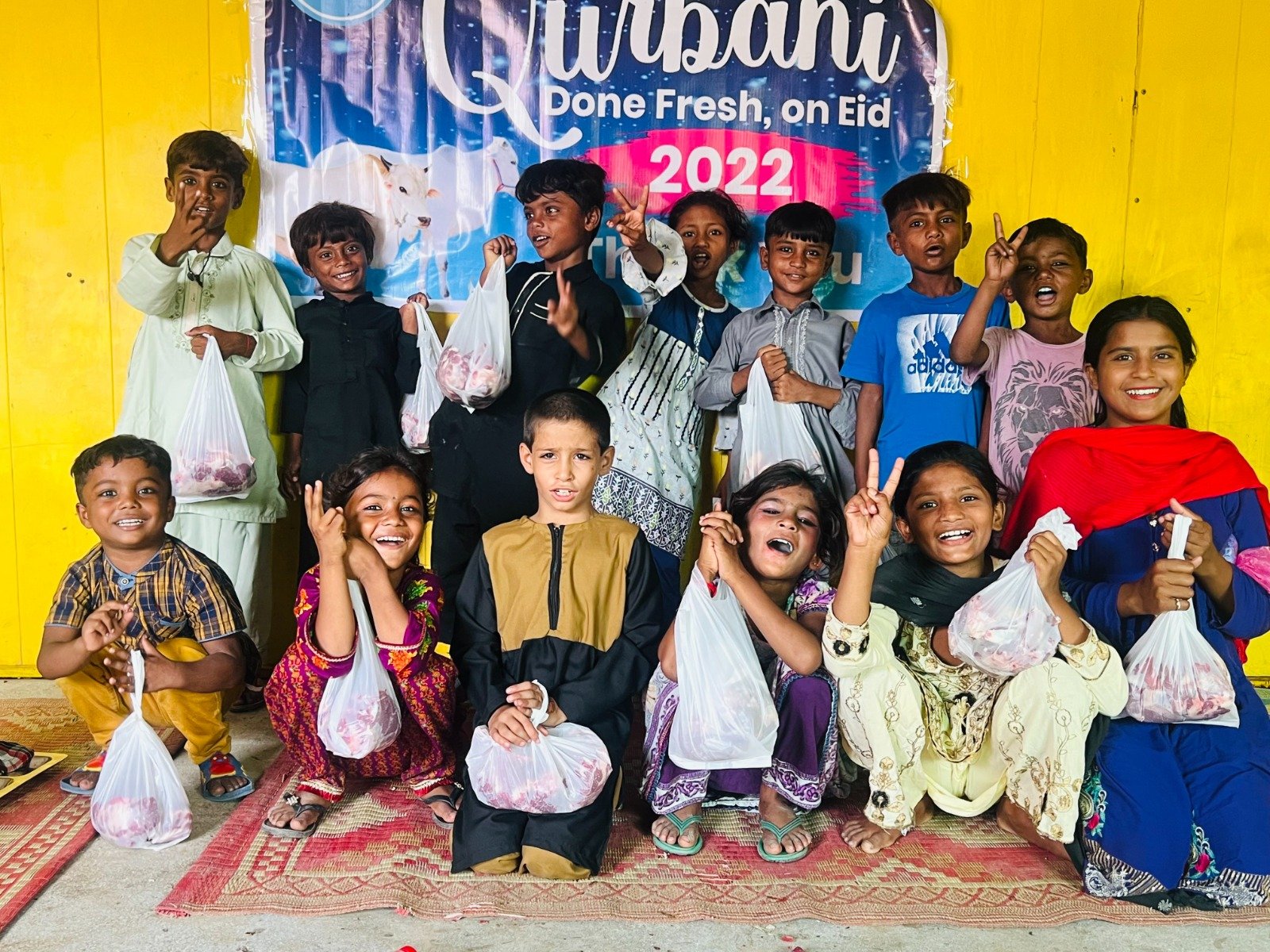
In Islam, there is a concept of two Eids, one being Eid ul-Fitr and the other Eid al-Adha. Eid al-Adha, which will be celebrated on June 17, 2024 this year commemorates the profound act of devotion by Prophet Ibrahim (AS) as commanded by Allah. This act symbolizes the ultimate demonstration of faith and obedience.
The literal meaning of Qurbani is sacrifice, the idea of giving something in the name of Allah. Every year on the 10th of Dhul Hijjah, Muslims around the world slaughter an animal in the way of Allah SWT like sheep, goat, lamb, cow or camel. This act symbolizes the willingness of Hazrat Ibrahim AS to sacrifice his son for the sake of Allah SWT.

Qurbani finds its origins in the profound story of Prophet Ibrahim (AS) and his son, Ismail (AS). Commanded by Allah (SWT), Ibrahim (AS) was tasked with sacrificing the one dearest to him – his beloved son, Ismail (AS). Despite his deep love for his son, Ibrahim (AS) demonstrated unwavering devotion to Allah (SWT) by preparing to carry out the sacrifice.
In a tender moment of obedience and acceptance, Ibrahim (AS) explained to Ismail (AS) the divine commandment entrusted to him by Allah (SWT). Remarkably, Ismail (AS) responded with humility and understanding, aware of his father’s love and the significance of fulfilling Allah’s (SWT) will. However, out of compassion, Ismail (AS) requested two conditions: to have his limbs bound to avoid struggling and for his father to be blindfolded to spare him from witnessing his son’s pain. His acceptance of the sacrifice was rooted in trust and love for his father, as well as a profound understanding of the divine purpose behind their actions.
As Ibrahim (AS) prepared to carry out the sacrifice, demonstrating his utmost submission to Allah (SWT), a miraculous intervention occurred. At the very moment of sacrifice, Allah (SWT) replaced Ismail (AS) with a ram, sparing the life of Ibrahim’s beloved son. This divine intervention not only saved Ismail (AS) but also served as a test of Ibrahim’s (AS) unwavering devotion and submission to Allah (SWT).
Ultimately, the story of Qurbani exemplifies the profound lessons of faith, sacrifice, and submission found within Islam. It underscores the importance of obedience to Allah (SWT) even in the face of the greatest challenges and tests. Through the example of Ibrahim (AS) and Ismail (AS), believers are reminded of the eternal rewards that await those who demonstrate unwavering faith and devotion to their Creator.
Giving Qurbani is a compulsion on every Muslim who is of age and has means to do so. Following are some of the rules which Muslims must kept in mind while choosing the animal to sacrifice:
If the animal is sheep or goat it must be at least one-year-old.
Cows and buffaloes must be at least two years old.
Camel must be at least five years old.
For an animal to be eligible for Qurbani, it must meet the criteria. These criteria include the animal must be in good health and the animal must not:
Being blind or missing an eye
Having missing half or more of their teeth.
Being underweight, thin or lean
Being lame or limping.
Having horns that are broken at the root.
With unwavering dedication and a compassionate spirit, SKZ successfully carried out the sacred act of Qurbani, distributing meat to over 500 deserving families. During the Eid vibe, we kept animals at school where children can spend more time with them. Witnessing Qurbani evoked empathy in children as they felt a connection with the animal being sacrificed.
From the initial stages of coordination and logistics to the execution and distribution of Qurbani meat, SKZ displayed exceptional organizational skills and a commitment to service. Qurbani meat is allocated for the slum communities because they are hardly able to get fresh meat. Distributing meat to the slum community helped in addressing their food insecurity and provided them with a valuable source of nutrition that they may not have regular access to.
We believe that only education and skill development can empower youth, shaping their futures and substantiating the deprived community.
BANK DETAILS
Bank Name: Bank Islami
Account Title: Saya E Khuda E Zuljalal
Account Number: 2053-5712157-0001
IBAN NUMBER: PK60BKIP0205357121570001
Bank Name: Cashplus Bank
Account Title: Saya E Khuda E Zuljlal
Account Number: 07845728
Sort Code: 08-71-99

© SKZ Foundation TM 2017. Privacy Statement , Terms & Conditions Registered Charity No: 1200520. Head Office: 4 hollis lock, Chelmsford CM2 6RR UK. Disclaimer: SKZ Foundation is not affiliated with any external websites. SKZ Foundation is not responsible for the content of external internet sites and any links from external web sites to this site do not constitute an endorsement of that site by SKZ Foundation.
Copyright @ 2024 Single Solution. All Rights Reserved.